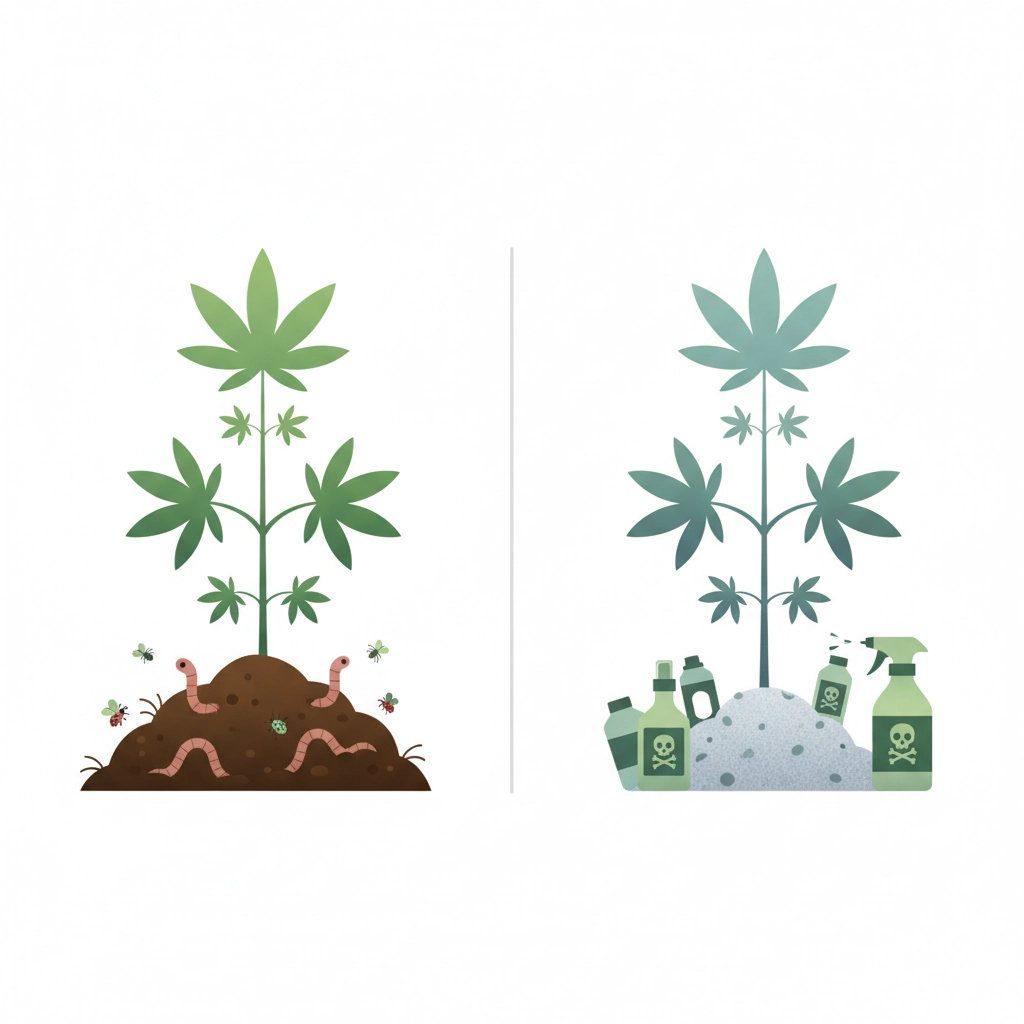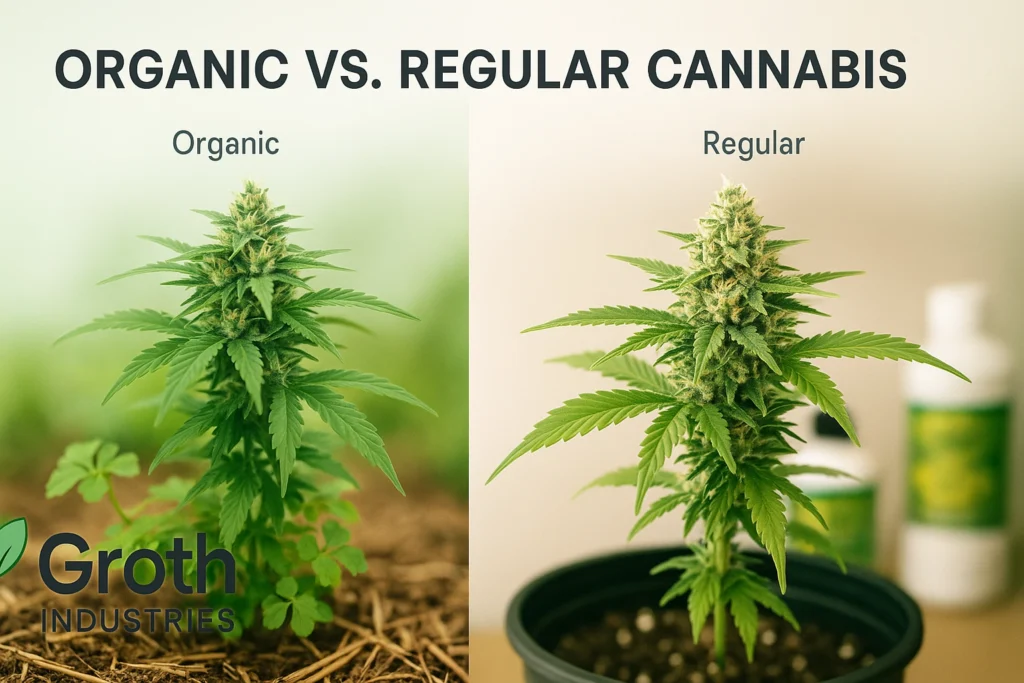The cannabis industry presents consumers with an increasingly complex decision matrix when selecting products, particularly regarding the distinction between organic and conventionally cultivated cannabis. This fundamental choice impacts multiple variables including health considerations, financial expenditures, environmental sustainability, and therapeutic efficacy. Understanding the comprehensive differences between these cultivation methodologies enables informed decision-making that aligns with individual priorities and circumstances.
Health and Safety Considerations
Organic cannabis cultivation eliminates synthetic pesticides, herbicides, and chemical fertilizers from the growing process, thereby reducing potential exposure to harmful residues that may persist in the final product. These chemical residues can accumulate in plant tissues and subsequently transfer to consumers through various consumption methods. The absence of synthetic chemicals in organic cultivation creates a cleaner product profile that minimizes potential adverse reactions and chemical interactions within the human system.
Conventional cannabis production frequently employs synthetic pesticides and fertilizers to maximize yield and control pest populations. While these chemicals serve specific agricultural purposes, their residual presence in cannabis products raises legitimate health concerns, particularly for medical patients with compromised immune systems or chemical sensitivities. The long-term effects of consuming these chemical residues remain insufficiently studied, creating uncertainty regarding potential health implications.
The cultivation methodology directly influences terpene profiles and cannabinoid development within cannabis plants. Organic growing conditions typically support more robust terpene expression, which contributes to enhanced therapeutic effects through the entourage effect. These naturally occurring compounds work synergistically with cannabinoids to produce more comprehensive therapeutic outcomes, potentially increasing the medical efficacy of organic cannabis products.

Financial Analysis and Cost Considerations
Regular cannabis products consistently demonstrate lower retail pricing compared to organic alternatives, making them more accessible to price-sensitive consumers. The conventional cultivation process generates higher yields through synthetic nutrient optimization and pest control measures, resulting in reduced production costs that translate to lower consumer prices. This affordability factor represents a significant consideration for medical patients requiring consistent access to cannabis products for therapeutic purposes.
Organic cannabis commands premium pricing due to increased production complexity and typically lower yields per cultivation cycle. The organic certification process, specialized growing mediums, and natural pest management strategies contribute to elevated production expenses. Additionally, organic cultivation requires longer growing periods and more intensive labor inputs, further increasing operational costs that affect final product pricing.
The economic evaluation extends beyond initial purchase price to include considerations of product potency and therapeutic effectiveness. Organic cannabis products often demonstrate enhanced potency profiles that may reduce the quantity required to achieve desired therapeutic effects. This increased efficiency can offset higher unit costs through reduced consumption volumes, creating potential long-term value for consumers prioritizing therapeutic outcomes.
Quality and Performance Analysis
Quality differentials between organic and conventional cannabis manifest across multiple parameters including flavor profiles, aromatic complexity, and overall therapeutic efficacy. Organic cultivation methods support natural plant development processes that enhance the expression of cannabinoids and terpenes, resulting in products with more pronounced flavor characteristics and potentially superior therapeutic properties.
Conventional cannabis production focuses primarily on maximizing yield and growth speed, which can compromise certain quality aspects including terpene diversity and cannabinoid complexity. The synthetic nutrients used in conventional growing may support rapid plant development but do not necessarily optimize the natural processes that produce the most desirable cannabis characteristics.
The storage stability and shelf life of organic cannabis products often exceed those of conventionally grown alternatives due to the absence of chemical residues that may degrade over time. This enhanced stability represents additional value for consumers who purchase products in larger quantities or require extended storage periods.

Environmental Impact and Sustainability
Organic cannabis cultivation aligns with sustainable agricultural practices that support long-term environmental health and ecosystem preservation. The elimination of synthetic chemicals reduces soil contamination, water pollution, and adverse effects on beneficial insects and microorganisms essential to healthy agricultural ecosystems. These sustainable practices contribute to soil regeneration and biodiversity preservation that benefit the broader agricultural landscape.
Conventional cannabis cultivation can contribute to environmental degradation through chemical runoff, soil depletion, and negative impacts on local ecosystems. The synthetic fertilizers and pesticides used in conventional growing may persist in soil and water systems, creating long-term environmental consequences that extend beyond the immediate cultivation area.
The carbon footprint associated with organic cultivation typically remains lower than conventional methods due to reduced synthetic chemical inputs and more sustainable energy utilization patterns. This environmental consideration increasingly influences consumer decisions as awareness of climate change impacts continues to grow.
Industry Standards and Regulatory Compliance
Organic cannabis certification requires adherence to strict standards that govern every aspect of the cultivation process, from soil preparation to harvesting and processing procedures. These comprehensive standards ensure product consistency and quality while providing consumers with reliable indicators of production methodologies and safety protocols.
Conventional cannabis production operates under standard regulatory frameworks that focus primarily on safety and potency testing rather than cultivation methodology specifications. While these regulations ensure basic safety standards, they do not address the specific considerations related to chemical residue levels or sustainable growing practices.

Groth Industries' Commitment to Organic Excellence
Groth Industries prioritizes organic cannabis products within our comprehensive product selection, recognizing the superior health benefits and therapeutic potential these products offer our customers. Our commitment to organic options reflects our understanding that cannabis consumers increasingly seek products that align with their health-conscious lifestyles and environmental values.
The selection process at Groth Industries emphasizes partnerships with certified organic cultivators who demonstrate consistent adherence to the highest quality standards. This careful curation ensures that customers receive products that meet or exceed organic certification requirements while delivering the therapeutic efficacy that medical and recreational consumers expect.
Our educational approach extends to helping customers understand the value proposition of organic cannabis products, including the health benefits, environmental considerations, and long-term therapeutic advantages that justify the premium pricing structure. This comprehensive education enables customers to make informed decisions that align with their individual priorities and circumstances.
Making the Right Choice for Your Needs
The decision between organic and conventional cannabis ultimately depends on individual priorities, budget considerations, and specific therapeutic requirements. Customers prioritizing maximum health benefits, environmental sustainability, and enhanced therapeutic effects often find organic cannabis products provide superior value despite higher initial costs.
Those with budget constraints or requiring consistent access to affordable cannabis products may find conventional options better suited to their circumstances while still receiving effective therapeutic benefits. The key lies in understanding personal priorities and making informed decisions based on comprehensive product knowledge.
Medical patients particularly benefit from organic cannabis products due to the enhanced safety profile and potentially superior therapeutic effects. The absence of chemical residues and enhanced terpene profiles can contribute to improved treatment outcomes and reduced risk of adverse reactions.
Ready to explore our premium selection of organic cannabis products? Visit Groth Industries today to discover how organic cannabis can enhance your therapeutic experience while supporting sustainable cultivation practices. Our knowledgeable staff can help you identify the organic products that best meet your specific needs and budget considerations.

